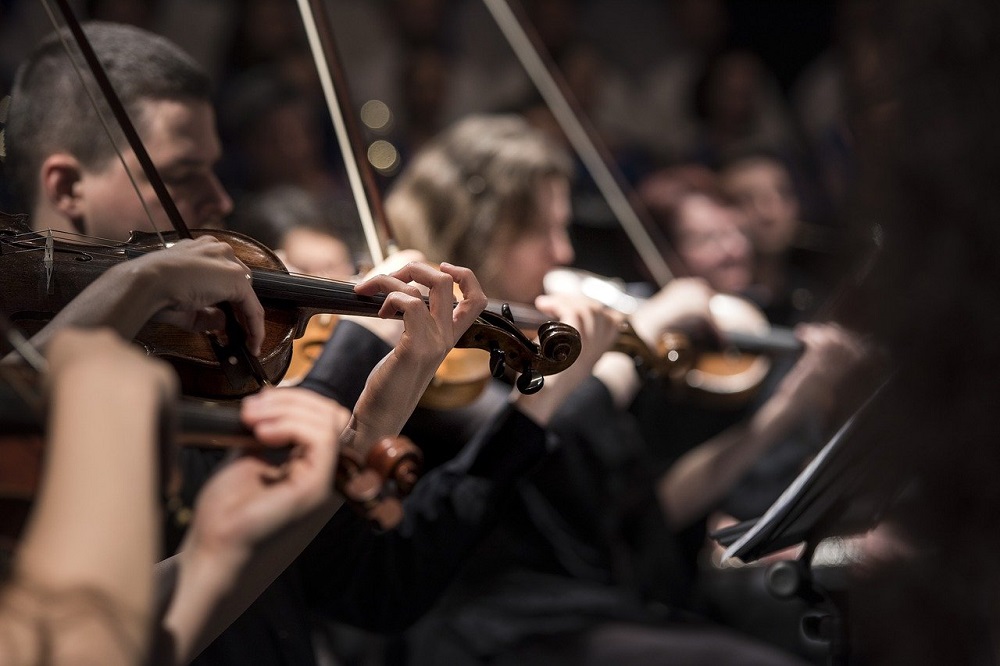Music review: Dresden Philharmonic Orchestra, Llandaff Cathedral

Peter Collins
Tchaikovsky’s final symphony, the Pathetique, is an intense, sombre work which takes the listener on an emotionally charged journey, ending in oblivion.
Listening to this dark, lamenting masterpiece while gazing up at Jacob Epstein’s imposing figure of Christ in Majesty at Llandaff Cathedral was certainly a thought-provoking experience.
Tchaikovsky was born into an Orthodox Christian household and received a religious education.
Whether he had maintained his faith by the time he came to write his sixth symphony is open to question. Gone is the apparent victory over fate that we see in the fourth and fifth symphonies. Instead, the sixth ends with haunting personal pain.
The premiere of the symphony took place in October,1893, nine days after the composer’s death. Was it, as some suggest, an aural suicide note?
Almost certainly not, despite the fact that in the last months of his life the homosexuality that throughout adulthood he had fought to conceal was about to become public knowledge.
Complexities
The Dresden Philharmonic Orchestra, situated beneath Christ in Majesty, explored the complexities of the symphony with great passion and insight, under the meticulous direction of conductor Stanislav Kochanovsky.
The cathedral, which housed a capacity audience, is an unusual and not entirely satisfactory venue to host orchestral concerts or a work of this magnitude.
We rested our motorcycle helmets around the font, while the cushions normally used by kneeling worshippers at prayer were employed by some in the audience to make the small wooden seats a little more comfortable.
Acoustic
The acoustic at the cathedral is obviously not as good as the world-ranking acoustic at the RAAC (Reinforced Autoclaved Aerated Concrete)-blighted St David’s Hall where this concert was originally to have been held.
No matter, the capacity audience was grateful to have the opportunity to see and hear this world-renowned orchestra.
The austere seats had the benefit of obliging one to sit up straight and really listen to the music. That said, this performance was sufficiently powerful to hold the attention from start to finish.
The struggle between life and death which the symphony explores was clearly set out by this fine orchestra in a compelling interpretation which eschewed any hint of sentimentality or self-indulgence on the part of the conductor.
The orchestra displayed a concentrated sense of purpose throughout the performance and was especially impressive in the third movement. But it was the long silence at the end of the fourth and final movement which spoke volumes about the power of the work and this impressive interpretation.
The evening began with Mussorgsky’s Prelude to Khovanshchina–Dawn on the Moscow River. The poised and sumptuous playing by the orchestra was also evident in the next work, Mendelssohn’s Violin Concerto, with soloist Maria Ioudenitch.
Absorbing
The American-Russian violinist gave an absorbing performance of the concerto which highlighted the contrasting colours of the music in the enchanting dialogue between soloist and orchestra.
There was indeed passion in her playing in the first movement, marked Allegro molto appassionato. Her impressive technique was matched by a fervent enthusiasm and charm which served to highlight the essential innocence and simple joy of this concerto.
Ioudenitch was well served by Kochanovsky and the orchestra. Kochanovsky was always firmly in control, especially in the Andante movement where he ensured that Ioudenitch had the space and freedom to explore the radiance of the music.
As in the Tchaikovsky, they avoided sentimentality and worked with soloist to produce a performance that pleased both head and heart.
The audience was delighted with this memorable concert. The applause could be heard in the grounds of this splendid cathedral on a late spring evening.
Support our Nation today
For the price of a cup of coffee a month you can help us create an independent, not-for-profit, national news service for the people of Wales, by the people of Wales.





